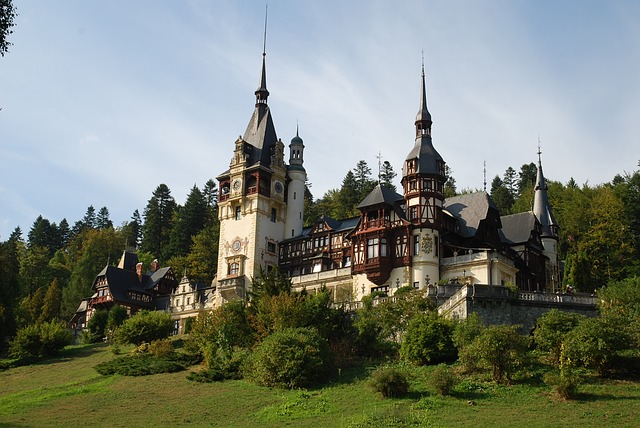Business Etiquette & Culture in Romania

Top Tips for Doing Business in Romania
Culture influences language and language, in turn, influences culture. This happens in ways both obvious and almost imperceptible. TJC Global understands that being fluent in a language also means being fluent in the subtleties and intricacies of the culture and business etiquette associated with it. To ensure that no embarrassing misunderstandings occur in a professional context, all our translators and interpreters are experts in the business culture and etiquette associated with the languages they work with.
An understanding of Romanian mentality, culture and etiquette is key to business success in Romania. Read on to find out our top tips for doing business in Romania.
TJC Global understands that being fluent in a language also means being fluent in the subtleties and intricacies of the culture and business etiquette associated with it. To ensure that no embarrassing misunderstandings occur in a professional context, all our translators and interpreters are experts in the business culture and etiquette associated with the languages they work with. Read on to find out our top tips for doing business in Romania.
About Romania
“Once upon a time, the mysterious and creepy realm of Dracula seemed like a figment of Bram Stoker’s imagination. But it turns out that the inspiration for this dark kingdom is real, found in a Romanian province. The mist-covered mountains are real, the crumbling castles are real, the howling wolves, swooping bats, peasants making the sign of the cross, all real,” wrote Marilyn Johnson in the November 1994 edition of Life. The largest country in southeast Europe, Romania has a fascinating culture, a long, turbulent history, and a natural environment that is richly diverse. With a population of over 2 millon, its capital city Bucharest is the sixth largest city in the EU.
Romanian Language
Romanian is spoken by around 91% of the population, with 6.5% speaking Hungarian, 1.1% Romani and a smaller minority using German.
Romanian is a Latin based language which is closely related to the language of the ancient Roman Empire, particularly in terms of structure. It is to some extent mutually intelligible with Italian and is also closely related to French and Portuguese. Romanian uses a version of the Latin alphabet with 31 letters. Its five additional letters are Ä‚, Â, Î, Ș, Èš.
The major ethnic minorities, Hungarians and Germans use their own languages in school and civil administration.
The literacy rate in Romania is approximately 98% and most young Romanians living in towns and cities are able to communicate in English and French. Knowledge of foreign languages is very widespread, particularly in urban areas, with 80% of Romanians speaking one foreign language, 25% two and 4% more than three.
Useful Romanian Phrases
- Hello – Salut / Buna ziua
- Hello (on phone) – Alo
- Goodbye – La revedere
- How are you? – Ce mai faci? (informal) / Ce mai faceti? (formal)
- Pleased to meet you – Îmi pare bine de cunoÈ™tință / Încântat de cunoÈ™tință
- Cheers! – Noroc!
- Bon Appetit – Poftă bună!
- Please – Te rog (informal) / Vă rog (formal)
- Thank you – Mersi
- Sorry – Pardon
Please click here for more information about our Romanian Translation and Interpreting Services
Business Etiquette in Romania
Shaking hands is standard when you greet someone in Romania and you may also be required shake everyone’s hand when taking leave of a meeting. Older men may kiss a woman’s hand although foreigners will not be expected to do so.
It is important to use the correct honorific title in Romania until you reach a level of comfort where this is no longer necessary. “Domnul” for Mr. and “Doamna” for Mrs./MS + their surname or title such as ‘Doctor’ or ‘Professor’ is the form required. When you become closer with your partners, this title + the first name will be used. Seniority in age or status is much respected. Younger people are expected to initiate the greeting.
Romanians are known for being a very friendly, welcoming and fun-loving society. However, modesty, building personal relationships and maintaining proper etiquette are very important. For this reason, Romanian’s may seem formal or reserved on first meeting and until they have established a relationship with you. Spending time getting to know your partners is very important and will be very useful for cutting through red tape in a business world often governed by bureaucracy.When they feel as if they have got to know you, Romanians become more relaxed and informal and you may feel at liberty to lighten the conversation.
Romanian’s prefer to do business with down-to-earth people who do not boast about their achievements as they value modesty.
It is important to note that Romanians see this as getting to know you on a personal level and do not see you as a representative of your company so future colleagues in Romania will go through the same relationship-building process.
If you say you will return a call, it is very impolite not to do so. A polite telephone manner is crucial at all times.
Romanians are very sociable people and love to talk everywhere and anytime, so mobile phones are a powerful tool for a businessman in the city.
Western business etiquette regarding timekeeping is followed. Appointments should be made in advance and checked again before the respective date. Punctuality is a virtue and if you are going to be late, you must telephone in advance although in state-run organisations, punctuality is less often observed and you may be expected to wait.
Being a country still in transition, it might prove beneficial to your business to make friends with influential businessman. Connections with influential persons can be advantageous in times of business instability.
Romanians are willing to work during the weekends and holidays as well, but not during major holidays such as Christmas and Easter unless they see this as profitable. However, you should avoid arranging meetings or trying to make contact during July and August, as this is the time when all Romanians are at the seaside, forgetting all about business.
Wait for direction to sit down in formal meetings.
Hire your own interpreters and translate one side of your business card into Romanian.
Presentations should be clear and use facts and figures to back up claims. Exaggeration is not appreciated.
Body language can be very expressive in Romania. This is especially important as Romanians are often indirect when negotiating. In order to avoid confrontation and remain polite they will often tell the other party what they think they want to hear. This is also etiquette you should adhere to – remaining polite and not too direct during discussions.
Romanians can be tough negotiators although decisions are easily reversed.
Dress & Appearance
Personal appearance and presentation is very important in Romania. It is important to wear proper business dress at formal meetings. Women should wear business suits and skirts which fall at the knee or below. In less formal situations such as business lunches, business casual attire may be worn.
Only take your jacket off with permission or by following the lead of seniors.
Dining Etiquette
Romanians are very famous for their hospitality. Business meetings and cocktails parties are in the majority of the cases very warm and friendly. Business lunches are also very common. Work colleagues, after a hard day, especially in multinational companies, often socialise together in the evening at a local bar. It is quite uncommon for a Romanian to invite foreign businesspeople to their homes or do business in a residential place.
Small gifts of wine, chocolate or local liquor are good options if invited to a Romanian home.
Wait for the host/ess or group to say: ‘Pofta buna’ – “Bon Appetit” before beginning to eat.
Beliefs and Superstitions
Romanians are very superstitious people, like most Latin people, their traditions run back from Roman and Thracian times.In Dracula, Jonathan Harker notes: “I read that every known superstition in the world is gathered into the horseshoe of the Carpathians, as if it were the centre of some sort of imaginative whirlpool”.
If taking flowers as a gift, only take an odd number (an even number is related to funerals).
All dreams between Saturday and Sunday will come true.
At Easter and at Christmas, you should eat fish or chicken so that you will be as light as the bird and as quick as the fish.
Locations we cover in Romania
Romanian Interpreting Services

Romanian Arbitration Interpreters
Our arbitration interpreters can assist those seeking an alternative to litigation. Read more…

Romanian Business Meeting Interpreters
Our Romanian business meeting interpreters can assist you at negotiations, discussions and collaborations. Read more…
Romanian Conference Interpreters
At TJC Global, we have a network of Romanian certified conference interpreters for multi-national conferences of all natures. Read more…

Romanian Court Interpreters
Our Romanian court interpreters are familiar with the format, conventions, procedures and requirements of court interpreting. Read more…

Romanian Deposition Interpreters
We can provide specialist deposition interpreters for witness testimonials as are common in the US and Canada. Read more…
Romanian Legal Interpreters
TJC Global’s Romanian legal interpreters can cover court cases, hearings, tribunals. Read more…
Romanian Legal Translation
We cover a variety of legal material and documents including, but not limited to: letters, legal documents, contracts, summonses, evidentiary documents, statements, patents and more.
Romanian Medical Interpreters
Our medical interpreters are closely acquainted with medical terminology ensuring they deliver informed, precise and efficient interpreting in this highly specialised sector.

Romanian Medical Translation
Our Romanian medical translators are all native speakers of your target language and often hold a degree or certificate in the medical sciences.

Romanian Technical Translation
Our technical interpreters can cover assignments in a broad range of industries; including aerospace, motoring, manufacturing and civil engineering. Read more…
Looking for translation or interpreting assistance?
TJC Global provides specialist interpreting and translation services in various specialist fields. Whatever your requirements, we can find the right linguist to assist you. If your industry or project type is not listed here, please contact us directly with your enquiry.
Our language specialists utilise their knowledge of subject-specific terminology to deliver precise, unambiguous translations, whatever the context – enabling you to communicate effectively with the rest of the world. We are also able to adapt to almost any type of project.
What to do next? Contact us
Please use the Quick Quote system above for a quote for interpreting, translation services or a related enquiry.
If you would like more information about our language services, please contact us.




